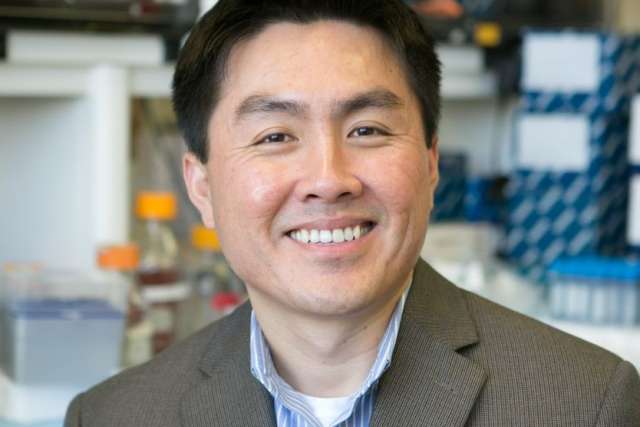A team led by Roger S. Lo, MD, PhD, a member of the UCLA Jonsson Comprehensive Cancer Center, has received a $900,000 grant from the Melanoma Research Alliance to study how to prevent melanoma patients from relapsing on two key types of melanoma therapy.
Lo, a professor of dermatology at the David Geffen School of Medicine at UCLA, is the administrative principal investigator on the three-year project. Douglas B. Johnson, MD, MSCI, an associate professor at Vanderbilt University, is the co-principal investigator, and Gatien Moriceau, PhD, an assistant adjunct professor at UCLA, is the other investigator.
Lo explains that metastatic melanoma usually is treated with mutation-targeted or immune checkpoint blockade therapies, which have favorable response rates. But often the cancer grows back and spreads more aggressively than before. This is called acquired resistance. In addition, only about half of patients who have mutations of the BRAF gene are eligible for mutation-targeted therapy. His team aims to make mutation-targeted therapy available for more patients with melanoma. Lo added, “Traditionally researchers try to identify how the cancer has changed or evolved and then design ways to reverse the change(s). Here, we are taking a new approach to identify how the cancer changes or evolves and then design ways to prevent the change(s) or melanoma evolution on therapies.”
The approach is based on understanding how melanoma quickly changes focal parts of its genome through shattering and stitching together its DNA and how parts of the rearranged DNA carrying resistance-causing genes become circular DNAs that exist outside the chromosome, fueling diversity of cancer cells and adaptation to therapies.
“We hypothesize that these hotspots of accelerated changes enable melanoma to put evolution on hyper-drive and acquire resistance,” Lo added. “We will use state-of-the-art technologies to analyze the specialized DNA structures that result from such accelerated or punctuated evolution in tumors from patients that have acquired resistance and compare to them to tumors before treatment.” The team led by Lo anticipate that they will be able to design combination therapies to prevent and minimize acquired therapy resistance.
The UCLA Jonsson Comprehensive Cancer Center is a leader in cancer care, research and education. Our more than 500 physicians and researchers develop new therapies, diagnostics and other technologies, and work to advance our understanding of the disease. We do this while remaining patient-focused and providing the best cancer care possible. As one of only 51 comprehensive cancer centers designated by the National Cancer Institute, we have the resources on our campus, through our community clinics and with our partners to treat even the toughest cancers and discover new ways to prevent and eliminate this disease.
The Melanoma Research Alliance exists to accelerate treatment options and find a cure for melanoma. As the largest nonprofit funder of melanoma research, it has dedicated over $143 million and leveraged an additional $417 million in collaborative and follow-on funding towards its mission. Through its support, MRA has championed revolutions in immunotherapy, targeted therapies, novel combinations and diagnostics. Since its founding in 2007, MRA-funded investigators have been deeply involved in every major breakthrough in melanoma research. Due to the ongoing support of its founders, 100 percent of donations to MRA go directly to its melanoma research program.



